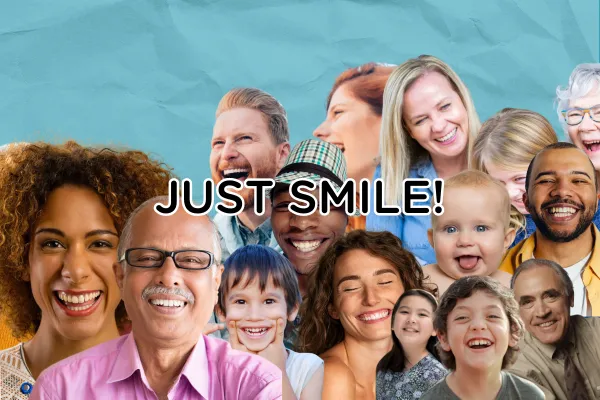General Inquiries: (587) 333-6349 - info@sanostate.com



Just Smile - How Grinning Changes Your Brain
“ ... do we honestly need empirical research to prove that smiling makes us feel better?” - Dr. Blake Ausmus
We often think of smiling as a reaction to something positive happening in our lives, like receiving good news or being in the company of loved ones. What a great part of life it is to smile and notice a smile on another person’s face. This is especially rewarding when we feel we might have been part of their reason for smiling. Research has shown that the act of smiling itself can actually lead to increased happiness, even if there is nothing in particular to smile about. Let’s dig into some of the research and see how this can be.
The Science of Smiling
As previously mentioned, smiling triggers the release of feel-good chemicals in our brains, like dopamine and endorphins. In one study, the researchers investigated the effects of smiling on stress response and pain tolerance (Kraft et al., 2015). They randomly assigned participants to hold chopsticks in their mouths in different ways to produce either a neutral expression or a Duchenne smile, which is a genuine smile where you are curling the ends of the mouth, and creating crow’s-feet by your eyes. The researchers measured participants' stress levels, heart rate, and pain tolerance before and after the smile manipulation.
The results showed that participants who held the Duchenne smile had lower stress levels and heart rates compared to those who held a neutral expression. In addition, those who held the Duchenne smile had a higher pain tolerance than those who held a neutral expression. The researchers also measured levels of endorphins, which are natural painkillers and mood boosters, in the participants' saliva. They found that participants who held the Duchenne smile had higher levels of endorphins compared to those who held a neutral expression.
A study published in Psychological Science found that people who were instructed to hold a pen between their teeth to simulate a smile reported feeling happier than those who held the pen between their lips, which prevented them from smiling. Furthermore, a more genuine-looking smile produced greater effects (Kraft et al., 2012). This suggests that the mere act of smiling can change how we feel.
The Power of Smiling
But the benefits of smiling don’t stop there. Smiling can also have a positive impact on those around us. Hennenlotter and colleagues (2005) examined the brain areas that were active while smiling, and the brain areas active while seeing a smile. Interestingly, but truthfully not so surprising, they found a big overlap. That is to say, the same area of the brain that sees a smile is activated when the brain creates a smile. These areas are also implicated in the emotional processes related to smiling.
But come on, do we honestly need empirical research to prove that smiling makes us feel better? Go ahead and smile right now as you’re reading this. The real Duchenne type! Do you not notice a difference? Then, go ahead and smile first, and then let the brain figure out why second.
Conclusion
I want to leave some words from the song “Smile.” The famous Charlie Chaplin wrote the song. In such an elegant fashion, he left a song without words for the world. Although the lyrics were added by John Turner and Geoffrey Parsons later, I feel as though the lyrics almost wrote themselves if you watch the original Chaplin film for this song. It was first sung by Nat King Cole, who happens to be my favourite vocalist of all-time, and the King of Pop, Michael Jackson, called it his favourite song. Needless to say, if there ever were a clear connection between the three historical greats of Charlie Chaplin, Nat King Cole, and Michael Jackson – it would only make sense that it is something as powerful as this song:
Smile, though your heart is aching
Smile, even though it’s breaking
When there are clouds in the sky
you’ll get by
If you smile through your fear and sorrow
Smile and maybe tomorrow
You’ll see the sun come shining through
for you
Light up your face with gladness
Hide every trace of sadness
Although a tear may be ever so near
That’s the time you must keep on trying
Smile what’s the use of crying
You’ll find that life is still worthwhile
If you’ll just
Smile
References
Hennenlotter, A., Schroeder, U., Erhard, P., Castrop, F., Haslinger, B., Stoecker, D., Lange, K. W., & Ceballos-Baumann, A. O. (2005). A common neural basis for receptive and expressive communication of pleasant facial affect. NeuroImage, 26(2), 581–591. https://doi.org/10.1016/j.neuroimage.2005.01.057
Kraft, T. L., & Pressman, S. D. (2012). Grin and bear it: The influence of manipulated facial expression on the stress response. Psychological Science, 23(11), 1372-1378. https://doi.org/10.1177/0956797612445312
Kraft, T. L., Pressman, S. D., & Grinberg, M. A. (2015). The effect of smiling on stress response and pain tolerance. Psychosomatic Medicine, 77(2), 217-227. doi: 10.1097/PSY.0000000000000113
Disclaimer
Our content is for informational and educational purposes and is not a replacement for professional advice, diagnosis, or treatment. If you're facing mental health concerns, please seek help from a qualified professional for personalized guidance. Every individual's situation is unique, so use the information here at your discretion. While we strive for accuracy, the field of psychology is ever-evolving, and our content may not always reflect the latest research. Please prioritize your privacy by avoiding sharing personal information in comments or interactions. Your well-being is our top concern, so use our content for educational purposes, but remember to rely on professionals for your specific needs.
General Inquiries:
Our Locations:
Additional Resources:
About Us:
We strive for excellence in psychological treatment. We are committed to providing professional, caring, innovative, and research-based services.
© 2024 Sano State Taylored Psychology. All Rights Reserved.

